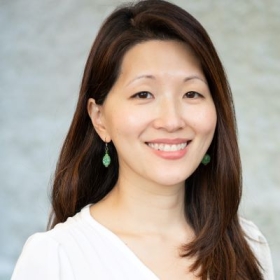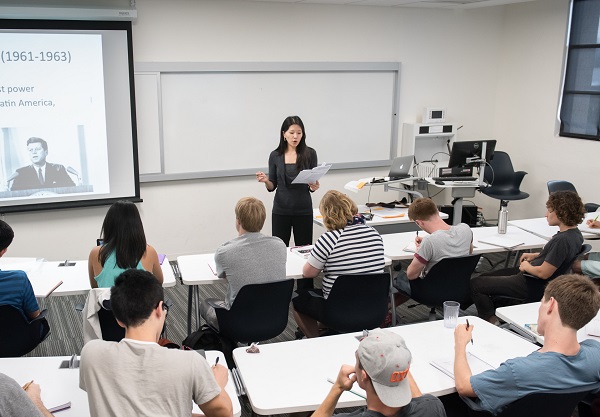
Jane Hong is a historian of U.S. immigration and engagement with the world, with a focus on Asia after World War II.
Jane Hong is the author of Opening the Gates to Asia: A Transpacific History of How America Repealed Asian Exclusion (University of North Carolina Press, 2019). She serves on the editorial board of the Journal of American History, the Gilder-Lehrman Scholarly Advisory Board, the managing board of the Asian Pacific American Religions Research Initiative (APARRI), and the Board of Directors of the Public Religion Research Institute(PRRI). Hong appears in two episodes of the Peabody Award-winning PBS docuseries, Asian Americans (2020). An active public speaker, Hong has shared her expertise with the Brookings Institution, Uber, and NPR’s The Takeaway, in addition to academic and faith-based venues. Hong is committed to bridging academic and public history. Her work in this area includes leading K-12 teacher seminars for the Gilder-Lehrman Institute of American History, consulting for television programs including Finding Your Roots with Henry Louis Gates, Jr. and American Idol, and penning op-eds for the Washington Post and the Los Angeles Times. In June 2018, Hong led a K-12 teachers’ institute on U.S. immigration through a California lens, hosted by the Gilder-Lehrman Institute and the Spencer Foundation. In July 2024, Hong will lead a two-week NEH seminar for 6-12 grade teachers on Asian American and Pacific Islander histories, in partnership with Gilder-Lehrman.
Hong’s first book, Opening the Gates to Asia (2019), charts a transnational movement to repeal America’s Asian exclusion laws at the intersection of Black civil rights and Asian decolonization. Drawing on archives in the US, India, and the Philippines, it argues that repeal was part of the price of America’s post-World War II empire in Asia. In addition to Japanese & Chinese Americans and their allies, the book centers the work of Indians and Filipinos in Asia and the US, tracing how their campaigns for repeal became entangled with anticolonial movements for Indian and Philippine independence.
Hong is currently finishing a book exploring how post-1965 Asian im/migrants have changed U.S. evangelical institutions and politics for Oxford University Press. Based on archives and over 100 oral history interviews, the project connects two historical developments that have transformed racial and religious politics in America over the past half century: the rise of the Religious Right and demographic changes resulting from the 1965 Immigration and Nationality Act. This research has been supported by the UCLA Institute for American Cultures, the Louisville Institute, APARRI, and PRRI.
Hong's next book uses the history of Orange County, California, to chart the rise of conservatism and political polarization among im/migrant communities of color, with a focus on Asian American and Latina/o/x conservatives since the 1970s. This work is supported by the John Randolph Haynes and Dora Haynes Foundation. For a preview of this research, see Hong’s Washington Post piece.
Selected Writings/Publications
“Introduction: Conservatisms and Fascisms in Asian America” (special issue co-edited with Adrian De Leon), Amerasia Journal 48 (2022/2023): 2-6.
"The L.A. Uprisings Sparked an Evangelical Racial Reckoning," Washington Post, April 29, 2022.
"Remembering the Atlanta Spa Shootings: Hate Crimes and Perceptions of Anti-Asian Discrimination during the Covid-19 Pandemic," Public Religion Research Institute (PRRI) spotlight, March 16, 2022.
“The Asian American Movement and the Church,” Journal of Asian American Studies 25:1 (February 2022): 63-95.
"What the Election of Asian American GOP Women Means for the Party" ("Made by History" column), Washington Post, March 8,2021
“In Search of a History of Asian American Evangelicals,” Religion Compass (December 2019): 1-9.
Opening the Gates to Asia: A Transpacific History of How America Repealed Asian Exclusion (University of North Carolina Press, November 2019).
“’A Cross-Fire between Minorities’: Black-Japanese Relations and the ‘Empire Quota’ in the Postwar Movement to Repeal Asian Exclusion,” Pacific Historical Review 87:4 (Fall 2018): 667–701.
“Manila Prepares for Independence: Filipina/o Campaigns for U.S. Citizenship and the Reorienting of American Ethnic Histories,” Journal of American Ethnic History 38:1 (Fall 2018): 5-33.
*Winner of the 2017-2018 Qualey Memorial Award from the Immigration and Ethnic History Society.
Courses:
HIST 102: United States Culture and Society II
HIST 208:U.S. Immigration History
HIST 209: The United States in the World since 1900
HIST 300: History Colloquium: Christianity and Politics in America since 1945
FYS: Racial Violence in U.S. History and Memory
FYS: Transpacific Movements and Activisms: Asian American Connections Across the Pacific
FYS: AAPI: The History of a Racial Category

